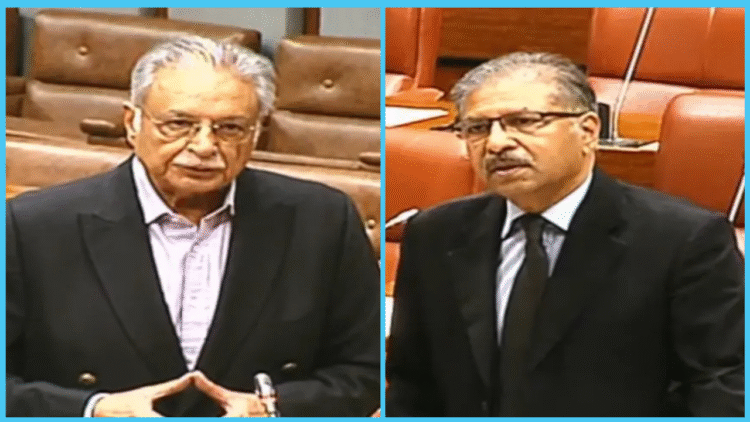ISLAMABAD: A heated debate unfolded in the Senate on Sunday as PTI Senator Ali Zafar warned that disturbing the “balance of the five fundamental pillars” of the 1973 Constitution through the proposed 27th Constitutional Amendment could trigger “major chaos” in the country.
The Senate session, held on a rare Sunday, was convened with a one-point agenda to deliberate on the controversial 27th Amendment Bill, which was tabled a day earlier — only hours after the federal cabinet’s approval. Senate Chairperson Syed Yousaf Raza Gilani presided over the meeting that also included a resolution to mark Allama Iqbal’s birth anniversary.
During the proceedings, PTI senators displayed pictures of their party founder Imran Khan on their desks in protest.
Five constitutional pillars
In his detailed address, Senator Zafar outlined five key principles that he said formed the spirit of the 1973 Constitution: Pakistan as a federation with autonomous provinces, supremacy of the elected parliament bound by the Constitution, protection of fundamental rights, an independent judiciary, and civilian supremacy.
“If you disturb the balance of these five pillars even slightly, the entire structure of the Constitution could collapse, leading to major instability,” he warned, adding that amendments should be based on national consensus rather than political expediency.
Zafar likened the Constitution to a “building’s foundation,” warning that tampering with it could make the entire system crumble. He recalled that military dictators in the past had damaged the Constitution with their amendments, which were later corrected through the 18th Amendment in 2010.
He argued that constitutional changes required consensus, not coercion, declaring, “You cannot enforce a Constitution through bullets.”
The PTI lawmaker claimed that the proposed 27th Amendment undermines the independence of the judiciary by establishing a Federal Constitutional Court (FCC), allowing the president to appoint judges, and increasing their retirement age from 65 to 68 — which, he alleged, would create “pliant judges.”
He further warned that transferring judges without their consent would bring the judiciary under executive control. “This will destroy the very independence of the courts,” he stated.
Opposition voices and coalition response
Zafar urged the Senate to reject the amendment, calling for “honest dialogue” on judicial reforms. PTI’s Hamid Khan also slammed the bill, saying constitutional changes required broad-based consultation. “The 26th Amendment was the death of the Constitution, and this 27th is an attempt to bury it,” he said.
Senator Azam Swati, wearing a black armband, warned that the government’s proposed changes would “ruin” the 1973 Constitution. PTI Senator Mohsin Aziz questioned the government’s haste, saying, “Why two amendments in just two years?”
Meanwhile, from the treasury benches, PML-N’s Pervaiz Rashid accused PTI senators of presenting a “one-sided picture,” ignoring past efforts to use the judiciary for political purposes. He said the opposition had failed to attend the standing committee meetings, forfeiting their chance to contribute.
PPP Senator Syed Masroor Ahsan rebuked the PTI for what he called “selective politics,” reminding them that PPP leaders, including Zulfikar Ali Bhutto and Benazir Bhutto, had sacrificed their lives for democracy.
BAP Senator Danesh Kumar raised the issue of minority representation, asking why the constitutional amendments did not include a clause ensuring minorities’ inclusion in the federal cabinet. “Are non-Muslims not Pakistanis?” he asked.
The session concluded with the Senate adjourned until Monday morning.
Concerns from rights groups
Outside Parliament, the Human Rights Commission of Pakistan (HRCP) criticized the government’s “haste” in pushing the amendment, noting the absence of “meaningful consultation” with the opposition, legal community, or civil society. “The proposed changes threaten judicial independence and civilian supremacy,” the HRCP warned.
Similarly, Karachi Press Club President Fazil Jamili expressed alarm over the bill, calling the rushed process “deeply concerning” and warning that lifelong immunity clauses and concentration of power could undermine democracy and the judiciary.




































































